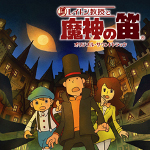Professor Layton and the Devil’s Flute Original Soundtrack
 |
Album Title: Professor Layton and the Devil’s Flute Original Soundtrack |
| Record Label: Piccolo Town |
|
| Catalog No.: PKCF-1017 |
|
| Release Date: December 16, 2009 |
|
| Purchase: Buy at CDJapan |
Overview
Released in November 2009 in Japan, Professor Layton and the Devil’s Flute marks the first instalment of a new triology in the series. The game and its followers will be a prequel to the first three games and tell the beginning of the story of Luke and Professor Layton. Musically, not much has changed. Tomohito Nishiura returns once again for the score, which is set in traditional manner like its predecessors. Does Professor Layton and the Devil’s Flute attract attention by an unsusal and refreshing soundscape or does it tell the same tale as always? Let’s carefully examine this.
Body
We’re granted by a new main theme for this game. It’s first heard briefly in “The Melody of the Devil’s Flute” and later further developed in a few other tracks, such as the follower “Theme of the Devil’s Flute”. The melody is especially lush and elegant when performed by the Layton Grand Caravan Orchestra. It has a nice smooth rhythm and there are wonderful violin and piano passages within. Still the overall arrangement is very close to “Theme of the Last Time Travel”, as wonderful as it is. In “Town of Water ~ Mist Halely Day”, the theme is transformed into a slow and melancholy piece with accordion, piano, and strings, whereas “The Guardian Deity of Paradise ~ Ragoucy’s Theme” develops the true beauty of the melody with a dreamy and frail arrangement of strings and bells. Once again, it reminds heavy of the earlier works of Nishiura like Dark Cloud or Dark Chronicle.
“Puzzle 5” marks another characteristic entry into the series’ themes. The slow composition of bells and piano works pretty fine and isn’t too intrusive to the gameplay. It’s orchestrated version at the end of the soundtrack goes some steps further. While the first half sounds identical to the original, orchestral instruments are added later to reveal a truly majestic and beautiful piece of music. “Puzzle 6 ~ Reasoning,” however, takes a turn away from the mysterious and chime-inspired atmosphere. The melody is the same, but Nishiura uses a Jazz style with enduring piano chords, percussion, and violin. One of the more interesting tracks is also “Black Market” with its interesting use of piano and woodwind melodies. It almost sounds a little Baroque-esque. “Town of Wind ~ Highyard Hill” is a gentle and beautiful piece with soft orchestration while “Calm Afternoon” and “Rumble!” return the typical Layton sound with frantic accordion melodies. Still, there are also dark and atmospheric tracks like “Mansion of Shadows” and “Ghost Factory” within the score, which help to avoid monotony.
Moving towards the end, there are a couple of tracks which are standing out. First, we have “Descole’s Theme”, probably a villain theme, with its foreboding use of organ and percussion. It’s the darkest and most climactic theme in the series thus far. It’s live version performed by the Layton Grand Caravan Orchestra is simply so breathtaking that it would be fitting into movie or animation score easily. “Theme of the Last Battle” also makes use of Nishiura’s traditional style of violin and percussion in form of battle themes. The original is good, but not that much engaging as the orchestral arrangement, where strings, horns, and percussion really develop the core of the melody. “The Legendary Paradise” closes the original soundtrack with an soft and dreamy note similar to “The Guardian Deity of Paradise ~ Ragoucy’s Theme”.
Summary
In terms of quality, Professor Layton and the Devil’s Flute goes a little step further compared to its ancestors. The musical variety is developed a little more with not only the typical French-inspired themes but also some effective orchestrations. This reminds to some of Tomohito Nishiura’s RPG scores like Dark Cloud, which were genereally well received. I’m glad that the sound team renounced the “High Quality Versions”, because they were not only more than stopgaps in my opinion. The awesome highlights are once again the orchestral renditions of four of the major themes. I also must say that the quality of the orchestra is superior to Professor Layton and the Last Time Travel, which already had fantastic arrangements.
Do you agree with the review and score? Let us know in the comments below!
4
Posted on August 1, 2012 by Max Nevill. Last modified on August 1, 2012.














